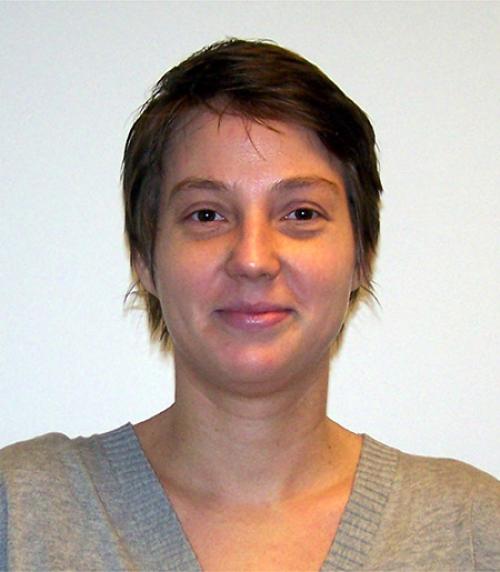April can be a tough month to be a Cornell student. Just a few weeks of classes remain, finals are looming and the memory of a disastrous prelim or paper still lingers.
But staff throughout the university are ready to help with new wellness initiatives, tools to help identify students who are struggling and numerous opportunities for students to maintain that balance between work and life that’s vital for staying well through the last couple months of the semester.
“Pressure at this time of year for students is understandable,” said Eve Abrams, a counselor/therapist at Cornell Health (pictured to the right). “They are thinking of the future. They feel it’s important to do well now so they can have that internship, that career, that happy life down the road. It can feel overwhelming.”
Ruby Rhoden ’17 found great support from her Arts & Sciences advising deans when she lost a close family member last year the day before her first final.
“The deans are really here for us,” she said. “They really care about all of their students. There’s no need to feel like you’re in this all alone.”
Rhoden’s deans were able to work with faculty to reschedule some of her exams and help her deal with her grief.
Counselors across campus have loads of resources and advice to offer students. “Worry and anxiety often stem from thinking too far into the future,” says Abrams. “When you get stressed, remind yourself to return to the present moment and stay close to what’s within your control. Take care of yourself. Eat. Sleep. Make a study plan that is bite-sized and achievable. Taking first things first can be a big help.”
A key starting point can be the “Let’s Talk” walk-in service offered by professional counselors weekdays across campus. Abrams offers “Let’s Talk” from 2-4 p.m. every Friday in Klarman Hall. Students use the time to consult about academic concerns, relationship problems, family difficulties and other issues. Abrams may encourage students to pursue additional counseling or consider other campus resources, including a new three-week Cornell Wellness Group, the Learning Strategies Center or their college advising office.
Some students find reassurance in talking with peers, which they can do through the student-run Empathy, Assistance and Referral Service (EARS). EARS counselors are available seven days a week for walk-in hours in the evenings at 213 Willard Straight Hall.
“Our job isn’t to give advice, but to help students explore what’s important to them about their classes and what they’re passionate about,” said one EARS counselor, a senior biology major in the College of Arts & Sciences. (We’re not using her name because the whole process is anonymous.)
Deans offer academic, personal help
Advising deans in the College of Arts & Sciences have lots of advice to offer students at this time of year. They also encourage faculty to alert their office when students start to struggle in class.
Advising deans often encourage students to:
- Talk to your advising dean about any issue, whether big or small. They have lots of ideas, information and resources to support you.
- Take advantage of faculty and teaching assistant office hours to actually talk with your teachers rather than email. You’ll accomplish a lot more in a shorter period of time.
- Don’t feel pressured to take 21 credit hours or complete a double or triple major. Future employers and graduate schools care less about that than you think.
- Don’t compare yourself to friends in other schools and colleges – their schedules, exams and measures of success will be different than yours.
- Prioritize a sense of balance, making sure you leave time for sleep, healthy eating, exercise, friends and other activities
- Learn to say no to activities you don’t absolutely love.
- Treat your school day like a work day, with a plan for what you will accomplish and a quiet place where you can work.
Staying on top of work
Mike Chen of the Learning Strategies Center can help with that piece.
On his desk are all sorts of paper planning forms that he regularly passes out to students, so they can map out their day, their week or even their entire semester.
Some tips he has for students:
- Work on big projects in small 10-15 minute chunks, rather than cramming for the final or writing the paper the night before. Set up meetings with professors so they can give feedback – those meetings will make you work on the project in advance.
- Pick your hardest class and commit to spending 10-15 minutes a day on problem sets or tasks for that class even if there is no assigned homework.
- When you prep for finals, it’s normal to spend all of your time studying for the first one, then cramming for the others. Instead, carve out time each day for each final.
- Schedule your studying time earlier in the day and don’t plan to accomplish great things on the weekend. You know it won’t happen.
- Put away your phone while you’re working and use it as a reward when you’ve spent ½ hour or so on work. And really put it away, in your bag or in a drawer.
- Don’t just study by reading over your notes, but give yourself a self-test or meet with friends and test each other. Quizzes like this make the material stick in your brain.
- Take the time for exercise, meditation, sleep and time with friends. Look for apps that track your goals in these areas.
All of the tips may seem obvious and will make you feel more prepared, Chen said, but they’re not easy to implement.
Adam Gianforte ’15, said he relied on several different resources when he ran into trouble halfway through his senior year.
“I was suffering from so much anxiety that I couldn’t get my work done,” said Gianforte, who’s now living and working in Chicago, pursuing an acting career.
What worked for Gianforte was a visit to a Cornell Health counselor, a deepening reliance on his Christian faith and talking with friends. Gianforte took part in a poster campaign called “Beneath the Surface,” which reassures students that struggles in college are normal and encourages students to take advantage of campus resources.
“I remember feeling very helpless at times when it came to balancing exams, athletics, social life, student organizations and attempting sleep, so I definitely understand how hard it is to handle stress,” said Mina Amick-Alexis ’15, another student who took part in the “Beneath the Surface” campaign. “The best advice I can try to give as a recent grad is to start understanding how to manage your stress levels and coping skills while you're still in college.”
Students should keep in mind that Cornell has a multitude of resources available to them.
Check out these resources
Cornell offers a plethora of resources for students during the semester. Make sure you are practicing self-care strategies that help manage stress and build healthy resilience. Getting enough sleep, eating well, exercising, spending time in nature, and socializing with others are all great ways to diffuse stress and regain balance. Free daily mindfulness meditation is offered at various campus locations Monday-Friday, and Cornell's events calendar advertises events and activities to help you take a break and connect with others. Talking to a professional can help, too: Cornell Health offers both traditional counseling and free “Let’s Talk” walk-in consultation. Students can also connect with trained peer counselors through Cornell's EARS program.
If you are feeling behind academically, talk with your professor or TA now about anything you don’t understand, and remember that Learning Strategies Center can help with study groups, tutors or individual time management plans. More resources for emotional, academic and social support are available on Cornell's Caring Community website.







